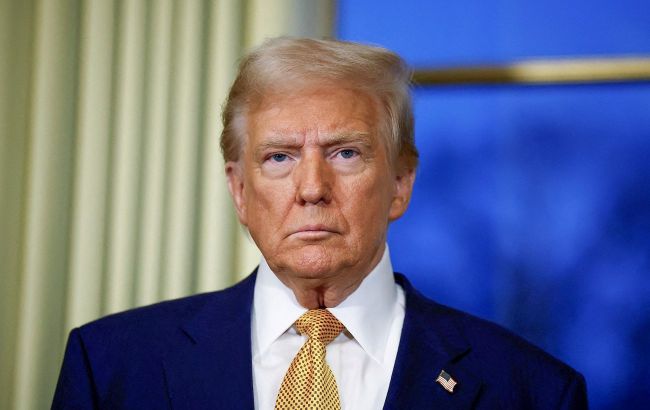How Epstein files divide Trump and his most die-hard fans
 Photo: Donald Trump (Getty Images)
Photo: Donald Trump (Getty Images)
The US president clashed with his supporters over the refusal to publish materials in the case of billionaire Epstein.
RBC-Ukraine explains the core of the case and why it is so important for Trump’s voters.
Key questions:
- Why is the Epstein case still in the spotlight, even though the billionaire died six years ago?
- What irritated Trump’s supporters?
- What consequences could it have for Trump in the future?
There is a serious crisis between the US president and his most radical supporters from the MAGA movement. It does not concern either the economy or migration, but is connected to the long-standing criminal case against billionaire pedophile Jeffrey Epstein, and is therefore primarily emotional in nature.
What is it all about?
In 2019, American billionaire financier Jeffrey Epstein allegedly hanged himself in his cell while in prison. Before that, there was a trial on charges of human trafficking for sexual exploitation.
The investigation showed that Epstein sexually abused dozens of minors. He was accused of creating and running a trafficking network of underage girls, some as young as 14, roughly from 1994 to 2004. According to the charges, he and his accomplices recruited vulnerable girls by offering them money for "massages," which later turned into sexual acts.
Epstein was known for his connections with influential people, including politicians, businessmen, and celebrities. He owned luxurious estates in New York, Florida, the Virgin Islands, and other locations. Epstein also had a private jet, nicknamed Lolita Express, because of allegations it was used to transport underage girls.
Although the official cause of death is suicide, there is much speculation on the topic. Recently published surveillance footage from the prison, according to WIRED, was edited using video software, and allegedly, three minutes were cut out. However, there is no 100% proof of video tampering. Besides, several prison guards did not go on patrol the night of his death, although Epstein had likely attempted suicide a month earlier.
Further questions arise about the origin of Epstein’s wealth. His lawyers claimed he was a billionaire. Federal prosecutors later estimated his fortune at about $500 million, which, of course, does not change the nature of the case.
Epstein’s death made it impossible to hold a trial, during which material evidence and other investigative materials could have been presented.
Why is the case still relevant?
The main question now is the existence of Epstein’s contact list – people who may have been his clients. Open sources confirm that he had ties with former US president Bill Clinton, British Prince Andrew, Woody Allen, Kevin Spacey, Tony Blair, Naomi Campbell, Michael Jackson, and dozens of other celebrities – even Donald Trump himself.
Not all people in Epstein’s circle were likely involved in his criminal activity. Some only had business or social interactions with him. But around this issue, most speculation exists.
Radical Trump supporters have demanded for years that the US authorities release the list, supposedly to prove that the American cultural and political elite were involved in these crimes. Naturally, Trump himself played on such sentiments during his election campaign, promising to publish the documents.
The new FBI director, Kash Patel – formerly a Trump-loyal blogger – assured that he would conduct a thorough investigation. Attorney General Pam Bondi, appointed by Trump, even claimed that she allegedly had Epstein’s client list in her possession.
However, in July this year, the FBI and the US Department of Justice, headed by Patel and Bondi, announced that the case was closed.
The Justice Department reported that it found no evidence of the existence of a compromising client list of the billionaire-pimp or proof that he had blackmailed influential people. Investigators added that further disclosure of materials might be inappropriate due to the sensitive nature of the information, especially for the victims of sexual violence.
All of that intensified speculation and conspiracy theories among Trump’s radical supporters. They now insist that the promise be fulfilled. Moreover, Trump’s supporters have begun to doubt his sincerity.
What consequences are possible?
By refusing to publish all the data from the Epstein case, Trump violated one of his election promises – and one that was far more clear and specific than, say, fixing the economy or tackling crime.
What’s more, this time the dissatisfaction arose among Trump’s most passionate supporters. He was criticized by influencers with million-strong audiences: Tucker Carlson, Nick Fuentes, Laura Loomer, Charlie Kirk, Candace Owens, and Steve Bannon. All of Trump’s other initiatives – the fight against illegal migration, trade wars, or rolling back diversity policies – primarily irritated his opponents. This could have long-term consequences.
Although Trump’s team is trying to find some compromises for the partial publication of Epstein materials, the result so far is disappointing. According to a Quinnipiac University National Poll, 63% of Americans disapprove of how the authorities are handling the Epstein case. It will matter even more next year, when the US holds midterm elections to Congress – assuming, of course, that this story hasn’t run its course by then.
For now, Trump faces a more pressing issue – dissatisfaction in Congress, which could block a number of presidential initiatives.
Many Republican congressmen are demanding the publication of the Epstein case materials. If this doesn’t happen, Trump can forget about their votes on other matters. Among these congressmen are some of the president’s most loyal allies, including Congresswoman Marjorie Taylor Greene and even Speaker Mike Johnson.
Sources: The New York Times, The Guardian, BBC, Politico, and WIRED.

